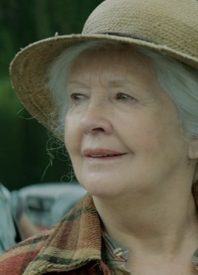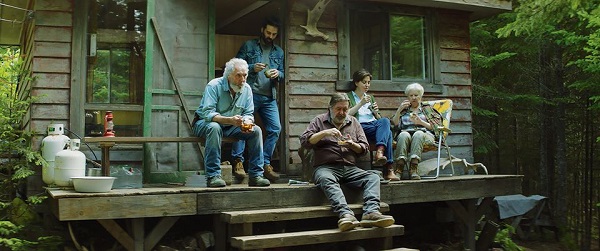
In a strange turn of events, I got review both this and Denis Coté’s Wilcox this week. Both, fit into a genre I’m not particularly fond of: the “we need to get back to nature” film, about characters (usually male) who feel compelled to reject society and live in the woods on their own. It’s a genre I’ve always found irritatingly disingenuous. The closest anyone has gotten to accurately portraying what it would be like to live in the woods fighting for your own survival is Debra Genik’s Leave No Trace, thus far the only film that seems determined to point out just how perilous such an existence would be.
Louise Archambault’s And the Birds Rained Down follows a similar premise, but with a slight twist. The film is based off of a novel of the same name by Jocelyne Saucier. The story is a complicated one, but in essence it is of three aging hermits living in the rural woods of Quebec. Their existence is a simple one, consisting of excursions into the nearby lake, and the cultivation of marijuana plants to sell to the nearby locals. When two women arrive following the death of the eldest hermit, all of their lives will be irrevocably changed. One is a cheerful octogenarian (Andreé Lachpelle) with a troubled past. The other is an artist (Ève Landry) takes with photographing and documenting the lives of the survivors from a traumatic fire that occurred long ago.
Did you get all that? I sure hope so. Archambault is balancing a number of story lines and ideas here, but the one that she seems most interested in is the ideas of persistent trauma. The need to remove one’s self from society, and precisely what would cause those feelings, are at the very forefront of Archambault’s film. It’s the thesis, so to speak, that the film wishes to interrogate.
Fascinatingly, the film is always very present. There are no cloying flashbacks, save the occasional jump back to the fire, an incident from well in the past that overwhelms most of the picture. The fire is precisely the reason that Landry’s artist character enters the picture, but the perspectives are from the present day in attempt to reconcile with the various traumas. At one point, a character says they may not have chosen the same path if offered the same opportunity again. It’s rare that films in this genre offer such feelings of regret.
And the Birds Rained Down could use with a pacing upgrade. Listen, I’m a foremost proponent of slow cinema, and films in which the felt duration is not a bug but a feature. There are definitely some spots that lag throughout this film. The general structure of Archambault’s film necessitates a gradual dolling out of information, piece-by-piece, so that it perpetually feels like we’re uncovering another segment of the puzzle. But it’s all so slowly doled out to us. I feel like this is partially the result of the adaptive structure. Novels have the ability to feel more lived in than films do, as a result of the differing nature between a viewer and a reader. Nobody reads at a pace too fast or slow for comprehension, but a film dictates its own pace in a way that a novel does not.
The film is at its best in the moments where Charlie (Gilbert Sicotte) and Marie-Desneige (Lachpelle) enjoy each other’s company. There’s a real tenderness to their conversations, and the potential romance offers the most drama that the film is capable of conjuring. Also of notable enjoyment is the cinematography of Matthieu Laverdiére, who gets the most out of the wooded landscape. The film offers a striking visual beauty whenever we’re out on the lake with our main characters.
Ultimately, there are enough ideas present to suggest that this is a very strong film from an exciting voice in Quebecois cinema. But at the same time the film does not land enough of them to properly reach greatness. It is, however, much better than most of the similar stories within its generic canon, and that’s always worth something.
Playing in Toronto at the Silvercity Yonge & Eglinton


